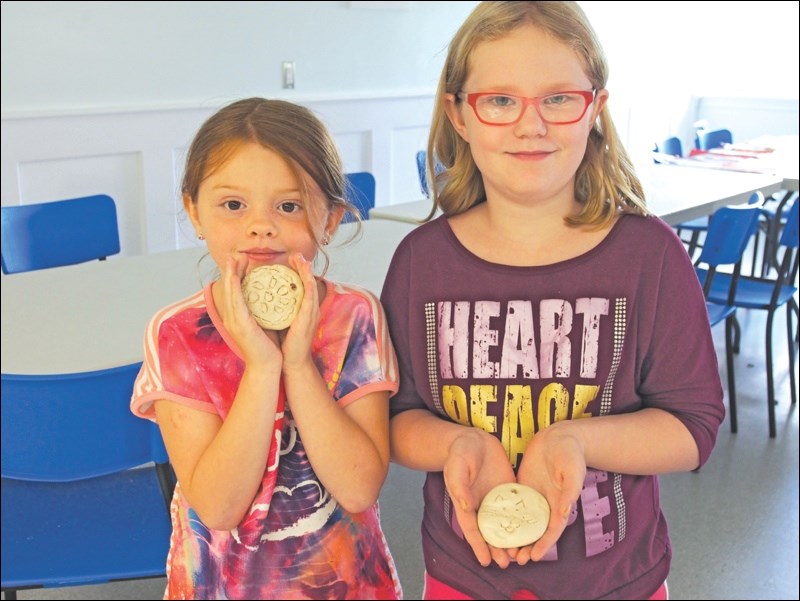It’s 11 am on a Wednesday morning, and a classroom at St. Ann’s Church is a hubbub of activity. Thirteen kids ages 6 to 11 are carving designs into clay circles, creating their own unique Olympic-style medals. The high-pitched voices coming from the classroom have an unexpected tone – nearly every child here is speaking French.
The children are taking part in Camp Soleil, a French-language summer camp offered by the local chapter of Canadian Parents for French (CPF), a national organization that aims to further bilingualism by promoting and creating opportunities for students to learn and use French.
Two CPF counsellors, Yaza Shapata and Natalie Behl, are leading Camp Soleil sessions all over the province throughout the summer. This week, they are in Flin Flon to organize the camp, which has a Rio Olympics theme, for local French immersion students.
All Camp Soleil programming is in French, and Behl and Shapata are consistent about reminding the campers to speak to the counsellors – and to each other – in that language.
“Most of them haven’t spoken French in a month,” said Shapata, “but after the first day, they warm up to the idea.”
“We play lots of little games where they have no other choice than to speak French,” Behl explained.
“It’s important for them to see that French exists outside of the classroom,” she added.
Melissa Danis agrees. As vice-president of the local CPF chapter, Danis organized the camp, is billeting the counsellors in her home, and has volunteered her time to help with camp logistics throughout the week. Both of Danis’ kids are in French immersion, and she sees Camp Soleil as a vital way to keep local kids connected to the French community during the summer months.
“It’s not even really a loss of language thing,” Danis explained. “It’s been proven that over the summer break there isn’t enough loss of language to warrant it being a real concern. It’s a loss of a sense of community. Being a French immersion kid, in a small town where there aren’t a whole lot of other kids outside of your little classroom that are in French, it’s hard to have that sense of community and that sense of belonging.
“It’s good for them to feel like what they are doing is beneficial long-term.”
Danis said Camp Soleil is the only local summer program available in French, a stark contrast to what she experienced herself as a French immersion student growing up in Saskatoon, where she could access diverse sports and arts camps in her second language.
Danis said in recent years, a local French teacher has led a French camp in Flin Flon, but she wasn’t available to run the program this summer, so CPF
Flin Flon turned to Camp Soleil as an alternative.
The local CPF branch paid CPF Manitoba a fee for the camp, which is partially covered by parent fees. The remainder is made up from the branch’s own funds.
“We are a non-profit, and we are running it as a benefit for the French immersion community,” said Danis. “I’m hoping that it goes off well enough that I can convince the membership to offer it again.”
In addition to the cultural benefits of the camp, the two CPF counsellors say the play-based environment of a camp can help kids to practice, and expand, their conversational French.
When campers start chatting together in English, the counsellors will remind them to speak together “en français”, explained Behl.
She said the kids are generally able to make that switch.
“They’ll slow down their conversation, but they do have the vocabulary.”
In order to attend Camp Soleil, campers must have completed grade 1 French immersion, so most students have at least two years of French under their belt, but little experience speaking their second language outside of school.
Experimenting with French outside of the classroom can also make language learning more fun, say the two counsellors.
“Camp is more of a social environment [than a classroom],” said Shapata.
As the Camp Soleil campers keep busy with sports, games, arts and crafts and field trips, they are beginning to communicate in French without thinking about it too much – one key stepping stone on the long road to bilingualism.




